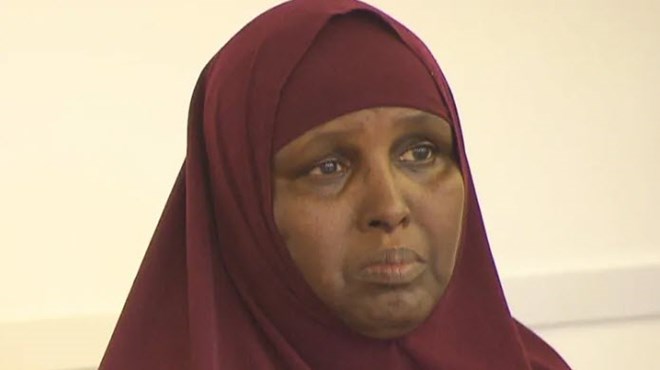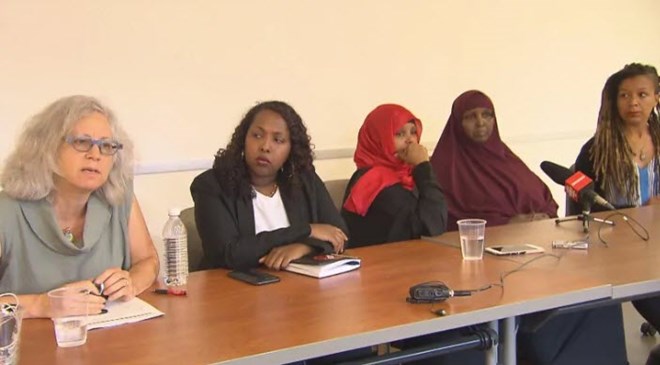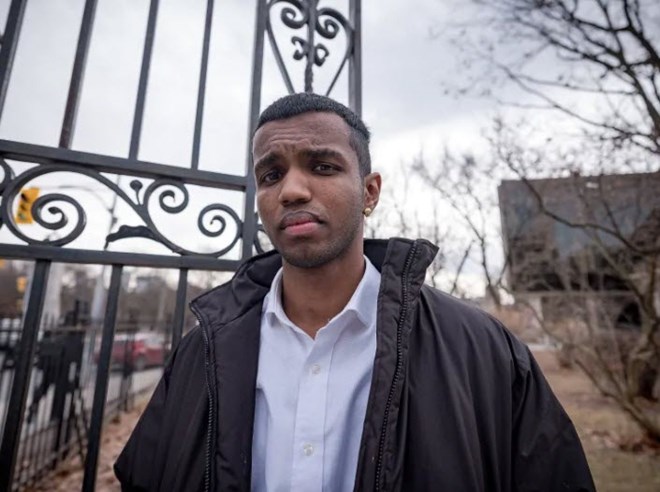
Speaking through an interpreter, Faduma Isse says deporting her 34-year-old son, Abdilahi Elmi, to Somalia would be a 'death sentence.' (Greg Bruce/CBC)
Abdilahi Elmi, 34, is set to be deported; advocates say the government failed to secure him citizenship
The mother of a former child refugee taken into foster care not long after arriving in Canada in the mid-1990s is making an emotional plea to save her son from being deported to Somalia in two days.
Speaking through an interpreter, Faduma Isse said sending her 34-year-old son, Abdilahi Elmi, to the country he fled as a child would be a "death sentence."
"They failed him," she said of the Ontario government, arguing it failed to secure citizenship for Elmi, who was accepted into Canada as a refugee at age 10.
"He will die if he goes to Somalia. He doesn't speak the language, he doesn't know the culture, he doesn't know the religion."
Elmi, who is scheduled for deportation on Aug. 21, is in custody at a remand centre in Nova Scotia.
He has a lengthy criminal record that includes various assault charges. A criminal sentence of more than six months makes non-citizens eligible for deportation.
'They were responsible for him'
Elmi arrived in Canada in 1994 after fleeing Somalia and living in a refugee camp with his grandmother. Not long after, advocates say, he was taken from his mother and placed into state care.
By age 16, he was living on the streets, where his contact with the criminal justice system began, fuelled in part by substance abuse issues that advocates say stem from the trauma he experienced as a child living through civil war.

With Elmi set to leave Canada in less than 48 hours, advocates in Toronto say they plan to step up demonstrations in the hope of calling attention to his case and securing a stay of his deportation order. (Greg Bruce/CBC)
"They were responsible for him 100 per cent and I was not allowed to do it on his behalf because he was not under my care," Isse said of applying for Elmi's immigration status.
If Elmi's case sounds familiar, it's because he's not the first former child refugee to spend time in state care who Canada has attempted to deport.
Abdoul Abdi, who came to Nova Scotia as a child in 2000, also faced deportation after various criminal convictions. In his case, too, the care system had not applied for citizenship on his behalf.
Last year, a Federal Court judge set aside the decision to send Abdi to a deportation hearing, arguing the government had not considered that he was "a longtime ward of the state." Ottawa in turn said it respected the decision and would not push forward with Abdi's deportation.
Speaking to reporters in Toronto on Monday, Elmi's supporters said they hoped to prevent cases like his and Abdi's from happening again.

Last year, a Federal Court judge set aside the decision to send Abdoul Abdi to a deportation hearing, arguing the government had not considered that he was 'a longtime ward of the state.' (Evan Mitsui/CBC)
"One of the things that should be called for is retroactively granting citizenship, not only for Elmi but for any child that was under state care, because the state is supposed to act as a parent of a child," said Toronto community organizer Naiima Farah.
"This is a form of maltreatment," she said. "The paperwork should have been done for him. He was a minor."
University of Toronto law professor Audrey Macklin went further, referring to the case of Jack Letts, dubbed "Jihadi Jack."
Letts, who travelled to Syria to join ISIS in 2014, had been a dual U.K.-Canadian citizen until his British citizenship was stripped this week.
"People are surprised and concerned that one country, the country that is effectively that person's home, can disavow him and make him the sole responsibility of another country that he has very little connection to," Macklin said.
"So, too, should we understand that Mr. Elmi and others in his situation properly belong to the country that formed them. And that country is Canada."
Balancing 'danger' vs. 'risk'
In Elmi's case, the Canada Border Services Agency (CBSA) issued him what's known as a "danger opinion" on June 26.
In an email, CBSA said the removal of convicted, repeat offenders is an enforcement priority.
Scott Bardsley, spokesperson for Public Safety Minister Ralph Goodale's office, explained that "a danger opinion balances the danger of the person against the risk the person faces if removed and any relevant humanitarian and compassionate considerations."
Danger opinions can be issued in cases where there are security concerns. For example, if a person is engaging in espionage or terrorism; has committed human or international rights violations; has been convicted of an offence punishable by a maximum term of 10 years or more in prison; or has engaged in organized crime.
CBSA can request a danger opinion, but it's ultimately up to Immigration, Refugees and Citizenship Canada to decide whether to issue one.
A spokesperson for Ontario's Ministry of Children, Community and Social Services said the ministry does not comment on individual cases.
'We need to start looking inward'
Elmi's mother told reporters he has no extended family in Somalia and that all of his siblings are here in Canada.
Advocates also point out Elmi is set to be deported to the Somali port city of Kismayo, which made headlines last month when gunmen stormed a hotel there, killing Somali-Canadian journalist Hodan Nalayeh, along with 25 others.
With Elmi set to leave Canada in less than 48 hours, advocates say they plan to step up demonstrations in the hope of calling attention to his case and securing a stay of his deportation order. A simultaneous news conference was held in Edmonton on Monday by various advocacy groups there.
"We have a case right there in front of our leaders and it's sad that there is overwhelming silence, especially when there is a critique of the situation of migrant children in the United States of America," said Farah.
"We need to start looking inward and saying, 'What we we doing?'"
https://hiiraan.com/news4/2019/Aug/..._facing_deportation_makes_emotional_plea.aspx

